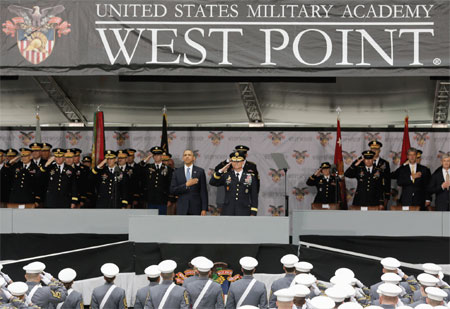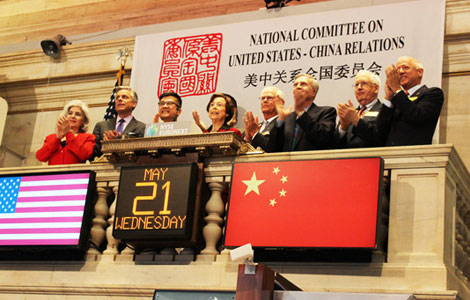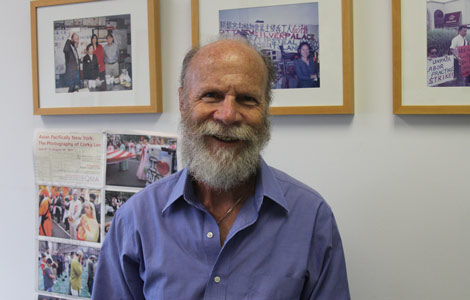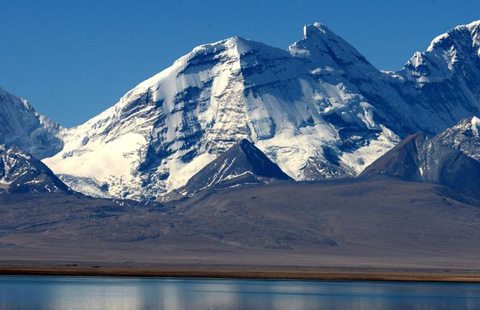Obama's speech disappoints
Updated: 2014-05-30 12:07
By Chen Weihua in Washington (China Daily USA)
|
||||||||
Foreign policy doctrine criticized by Republicans and Democrats alike
|
President Barack Obama (center) and Lieutenant General Robert Caslen Jr., superintendent at the US Military Academy, stand for the national anthem during a graduation and commissioning ceremony at the academy on Wednesday in West Point, NY. In a broad defense of his foreign policy, the president declared that the US remains the world's most indispensable nation, even after a "long season of war", but argued for restraint before embarking on more military adventures. Mike Groll / AP |
After more than five years in office, US President Barack Obama laid out a foreign policy doctrine at a commencement ceremony at West Point in a bid to appease critics from both the Republican Party and among his fellow Democrats.
Obama tried to strike a middle ground, arguing that he neither believes in "isolationism" nor "unilateralism."
But he did not seem to please many.
A Washington Post editorial on Thursday described Obama's speech as tying America's hands and rejecting decades of US foreign policy.
A Wall Street Journal editorial wrote that listening to Obama trying to assemble a coherent foreign policy agenda from the record of the past five years was like watching Tom Hanks trying to survive in "Cast Away". "Whatever's left from the wreckage will have to do," the editorial said.
Many noticed that Obama didn't mention the word "pivot" or "rebalance" to the Asia-Pacific once in his speech. Yet Obama did briefly touch on Asia a few times, most in pointed remarks on China.
"Russia's aggression towards former Soviet states unnerves capitals in Europe while China's economic rise and military reach worries its neighbors," Obama said.
He continued, "Regional aggression that goes unchecked, whether in southern Ukraine or the South China Sea or anywhere else in the world, will ultimately impact our allies, and could draw in our military. We can't ignore what happens beyond our boundaries."
"In the Asia Pacific, we're supporting Southeast Asian nations as they negotiate a code of conduct with China on maritime disputes in the South China Sea, and we're working to resolve these disputes through international law," he said, lamenting that the US Senate has not ratified the United Nations Convention on the Law of the Sea.
Obama's speech came on the same day when NBC-TV aired its interview with National Security Agency contractor Edward Snowden, who revealed he was actually a trained US spy. Obama, nevertheless, didn't feel the US has lost its moral high ground.
"We have a serious problem with cyber attacks, which is why we're working to shape and enforce rules of the road to secure our networks and our citizens," he said.
Obama did not name China on the issue, a week after the US Justice Department indicted five Chinese People's Liberation Army officers for cyber theft of trade secrets from US companies. China responded by canceling bilateral working group meetings on cyber security and pledged to reserve the right for more actions.
On Thursday, China's Foreign Ministry spokesman Qin Gang said it is the US who should reflect on what it has done.
"Instead of making all kinds of excuses and twisting the facts to get away with it, one should own up to his mistakes if he does something wrong," Qin told the daily briefing in Beijing on Thursday.
"A major power should never throw its weight around. It should leave some room for others, take into account other's concerns and show respect. If it chooses one set of standards for itself, and another for others, in other words, being lenient to itself while being harsh to others, how can it expect others to follow its leadership?" he said.
While Obama's remarks sound harsh to some Chinese, Shen Dingli, a professor and associate dean of the Institute of International Studies at Fudan University, disagreed.
"The US position on China was much harsher on the issue of the EP3 air collision in 2001, and on the PRC's missile exercise against Taiwan in 1996," Shen said, referring to the tension across the Taiwan Straits in the mid-1990s and the collision of a US spy plane with a Chinese PLA fighter jet in the South China Sea causing the death of the Chinese pilot.
Shen believes Obama's pointed words at China are because his own credibility of leadership is at stake as "he is under siege given his foreign policy performance vis--vis Syria and Ukraine."
The US allies in the region are also expecting harsh words from Obama in the wake of Crimea, according to Shen.
Yan Xuetong, dean of Tsinghua University's Institute of Modern International Relations, dismissed people's concerns that China's rise has not been peaceful and East Asia is on the brink of war.
Yan believes that East Asia has endured peace since 1991, longer than Europe which has had two wars since the Cold War, namely in Kosovo and Georgia.
"There has been no war in East Asia. Even today, the region, in my view, is still very peaceful," Yan said.
He said there might be accidents, but no danger of war in this region.
Douglas Paal, vice-president for studies at the Carnegie Endowment for International Peace, noted that Obama also failed to mention the rebalance in his subsequent detailed interview on his speech with NPR.
"So one has to wonder whether he has concluded the rhetoric surrounding the rebalance is creating more static than clarity. I see no sign yet that the substance of the policy (in the restrained sense that I understand it) has changed notably," he said.
Paal described Obama's speech as an odd document, piecing together talking points from around the world's hotspots and some general lessons from the excesses of the Iraq and Afghan conflicts, but not articulating a larger strategy.
"It appears to be a pollster and speechwriter's document and not a strategic argument. In that it falls very short in my opinion," Paal said.
chenweihua@chinadailyusa.com

 BookExpo America held in New York City
BookExpo America held in New York City
 Six Asian-American students awarded scholarships
Six Asian-American students awarded scholarships
 Children's Day celebration at Chinese consulate
Children's Day celebration at Chinese consulate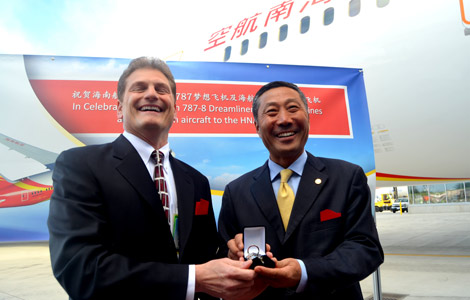
 Hainan Airlines receives its seventh Boeing Dreamliner
Hainan Airlines receives its seventh Boeing Dreamliner
 China's Oscars to be held in Hollywood
China's Oscars to be held in Hollywood
 Healthcare needs fixes: expert
Healthcare needs fixes: expert
 World leaders' childhood days
World leaders' childhood days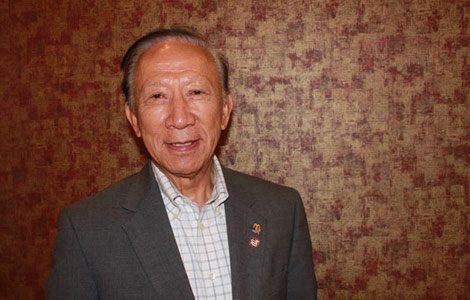
 C.C. Yin: A story of success and giving back
C.C. Yin: A story of success and giving back
Most Viewed
Editor's Picks
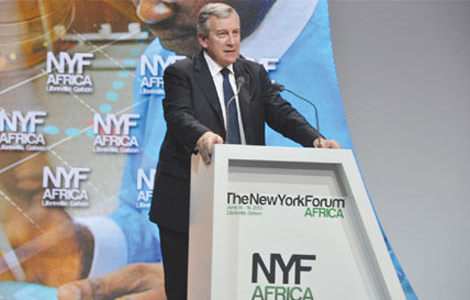
|

|

|

|

|

|
Today's Top News
Obama's boldest move on carbon comes with perils
Cult's horror calls for further crackdown
H1-B visa spouses may soon get to work in US
Obama's speech disappoints
China Inst. marks 88th with gala
Singers try out for China's American Idol
Xi urges more jobs in Xinjiang
China to lower market access to army equipment
US Weekly

|

|
